5. The Seventh Seal (1957, Ingmar Bergman)
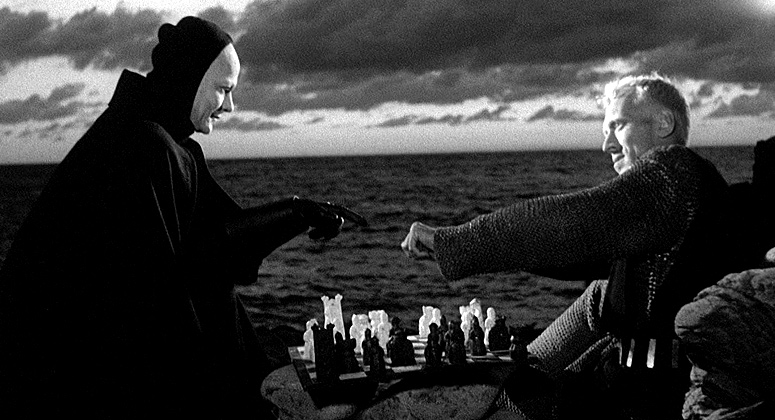
Ingmar Bergman’s The Seventh Seal is one of the more famous films of all time. Somehow there are people who haven’t seen it. If you haven’t, I can’t recommend it enough. You will be fascinated by its plot, even if it seems slow at times. The film follows Antonius Block (Max von Sydow), a knight returning from the crusades, as he tries to evade death personified (Bengt Ekerot) and stave off his end in a game of chess.
Aside from Bergman’s pessimistic existentialism (not an insult, but a compliment), the film is primarily about faith, doubt, and God’s existence. We hear Block cry out at God several times, most poignantly in a confessional when he says he cries out to God and “sometimes it seems as if no one is there.”
Unbeknownst to Block, he is actually confessing his doubt to Death, who responds saying “it could be that no one is there.” Block’s response is perfect: “if that is true, then all of life is meaningless.” The choice is that set forth by Pascal: it’s either meaningless, or faith is the most meaningful thing that there is.
4. Ordet (1955, Carl Theodor Dreyer)
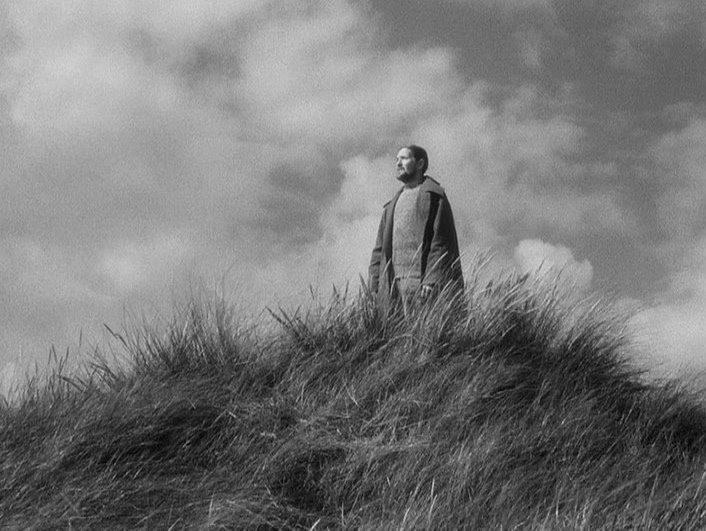
It’s hard to choose a Carl Theodor Dreyer film to write about for this list. Ordet is one of his many masterpieces, which shows three different approaches to faith and plays them against each other. The youngest of three children, Anders, is aligned with his father, a very devout protestant.
The eldest son, Mikkel, has lost his faith completely and at precisely the wrong time—his wife is pregnant. The middle child, Johannes, is insane to the point of thinking he’s Christ, an insanity that came from reading too much Kierkegaard (I’ve read a lot of Kierkegaard, so Johannes must have really read a lot). Mikkel’s wife’s pregnancy is anything but easy, putting serious strains on everyone’s faith.
What’s so theological about it? The film is an examination of faith and subjectivity, to be sure, but it’s primarily an examination of miracles—do they still happen and, if so, how does one know what is a miracle as opposed to a coincidence?
If you were to see a miracle today and someone claiming to be Christ claimed responsibility for it, would you believe that person? If not, on what theological grounds would you disagree and reject that claim? More importantly, are miracles still possible, or is God actually dead and we really are on our own? Ordet asks these questions, but it also offers answers in a unique and surprising ending.
3. The Tree of Life (2011, Terrence Malick)
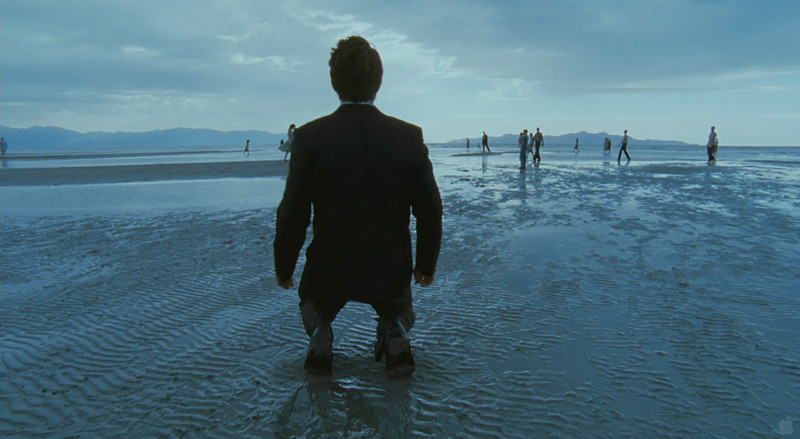
The Tree of Life is Terrence Malick’s best film and, in my opinion, is the most ambitious and best art film of all time. Deeply theological, it follows a young boy as he matures in the middle of US suburbia and is steeped in his mother’s faith.
Jack (Hunter McCracken) experiences many of the growing pains that everyone does, and is subject to a few more thanks to his emotionally abusive and strict father, Mr. O’Brien (Brad Pitt). His father is contrasted with his mother, Mrs. O’Brien (Jessica Chastain), an image of love, patience, and forgiveness, who nurtures her children as they grow and encourages them to support one another.
Early in the film, we learn that Jack’s younger brother has died inexplicably, and we see each of his parents attempt to cope with this loss. Given their sincere faith, it is difficult for them to reconcile their love of an all-good and omnipotent God with this great tragedy and evil. The film is built around the book of Job, especially chapter 38 in which God speaks directly to Job.
The problem of evil and God’s existence is an age-old problem in theology and philosophy, but it is answered in this film by way of Job. God reminds us that goodness itself comes from him. Without evil and disorder, goodness loses meaning.
2. Calvary (2014, John Michael McDonagh)
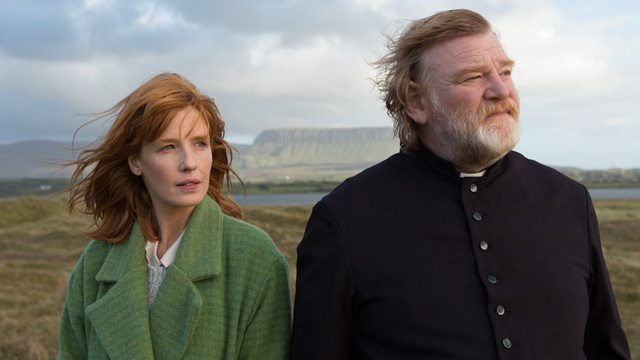
Calvary is one of the best films of late to deal with the sex abuse scandals of the Catholic church while also depicting what it’s like to be a good and innocent priest. An Irish drama, it stars Brendan Gleeson as Father James, a priest who receives a death threat in the confessional. The threat comes from a man who claims to have been sexually abused as a child by a priest and who is tired of abusive priests and the church covering up their sins.
Father James is also a good natured man, one trying to be patient and to do good for those in his community. As a part of his duties as a priest, he cannot go to the authorities with this threat, nor can he reveal to others what is about to happen to him. Sound a bit Christ-like?
Throughout the film, Father James talks of forgiveness and how unappreciated and undiscussed it is. He says, “there’s too much talk about sins and not enough about virtues,” and he’s right.
This is especially the case in the content of modern films. Something awful has happened in Calvary and something awful has happened in the Catholic church with these abuse scandals. Yet, there is no discussion about what ought to be done about these mistakes or how those not responsible can better the situation. Proper theology starts there, with an understanding of grace and mercy, and that’s something Calvary gets right that most films don’t.
1. Andrei Rublev (1966, Andrei Tarkovsky)
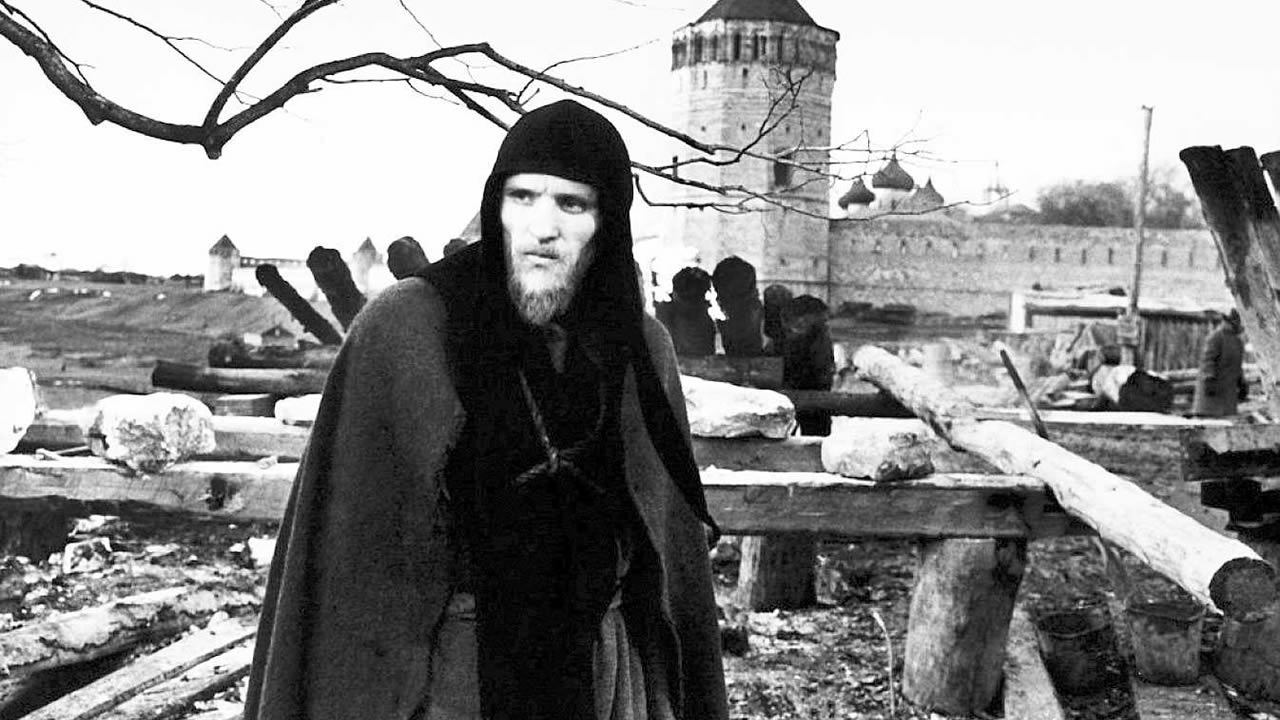
Andrei Rublev is one of Tarkovsky’s best, most artistic films. Broken up into 8 chapters and accompanied by a relevant but distinct prologue and an epilogue of Rublev’s actual artwork, the film is a historical drama analyzing the struggles of an artist (a divinely inspired one) in a world that seeks to limit his art and freedom. In that way, it parallels what Andrei Tarkovsky was dealing with in the USSR as he made his films.
Andrei Rublev is good natured, as we see from the very beginning of the film, and he tries to be longsuffering and kind to those around him. Unfortunately, no one is kind to him, and other artists are envious of his talent. After Andrei’s icons are destroyed, he takes a vow of silence and contemplates his purpose in the world.
Unlike the works of Bergman, Tarkovsky’s spirituality is both theological and optimistic. Andre Rublev is a film full of penance, forgiveness, and love for mankind, despite the awful things that surround the protagonist.
We see Rublev experience numerous crises of faith in his conversations with Theophanes the Greek and his fellow artists, and yet he still views icons as a window into heaven which allow one to reach beyond and transcend the daily life. He takes his vow of silence to atone for his sins, yet he continues in his faith and forgives and helps those around him. He even helps others, notably a young boy trying to mold a bronze bell, while taking a break from his art.
No single line of the film is theological or philosophical, but the work as a whole is undoubtedly one of the greatest theological films ever to be made.
Author Bio: Ben Wilson is a recent graduate of Yale College, where he studied Philosophy and Political Science. A film buff and addict, he views film as the proper medium for philosophy in the 21st century.